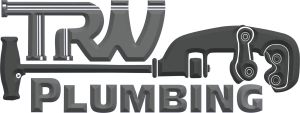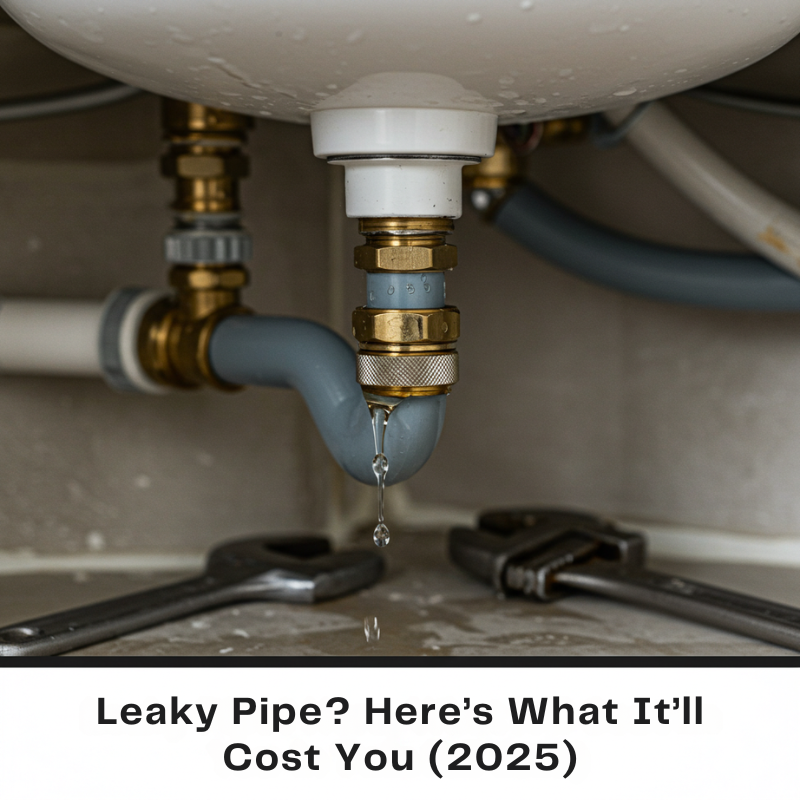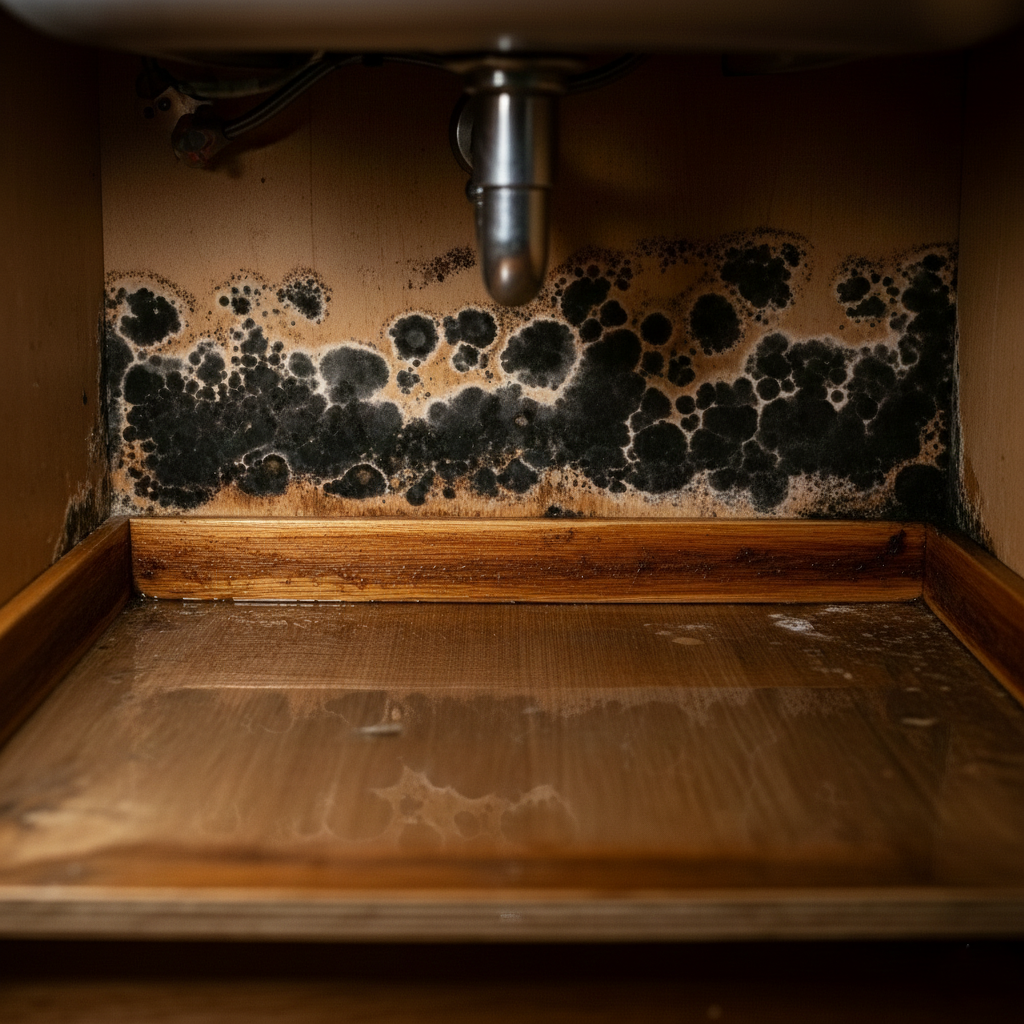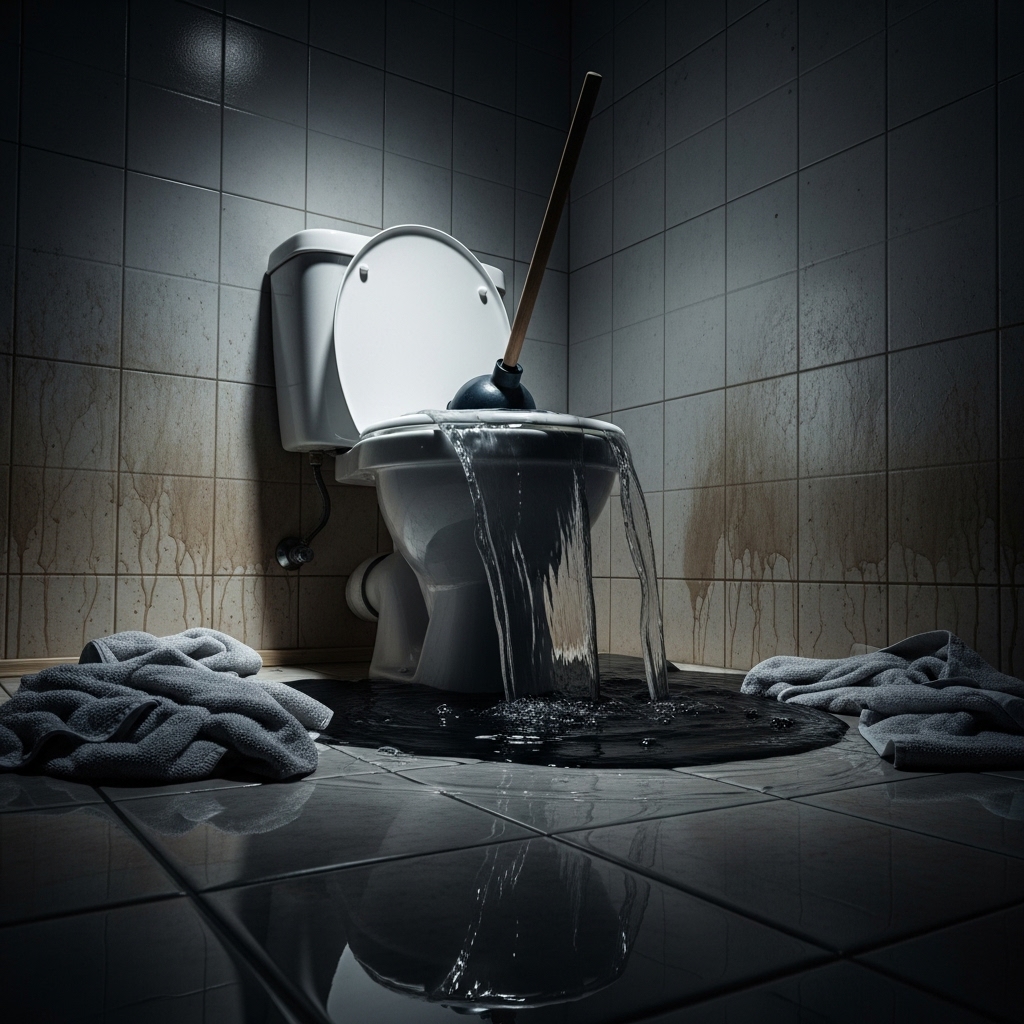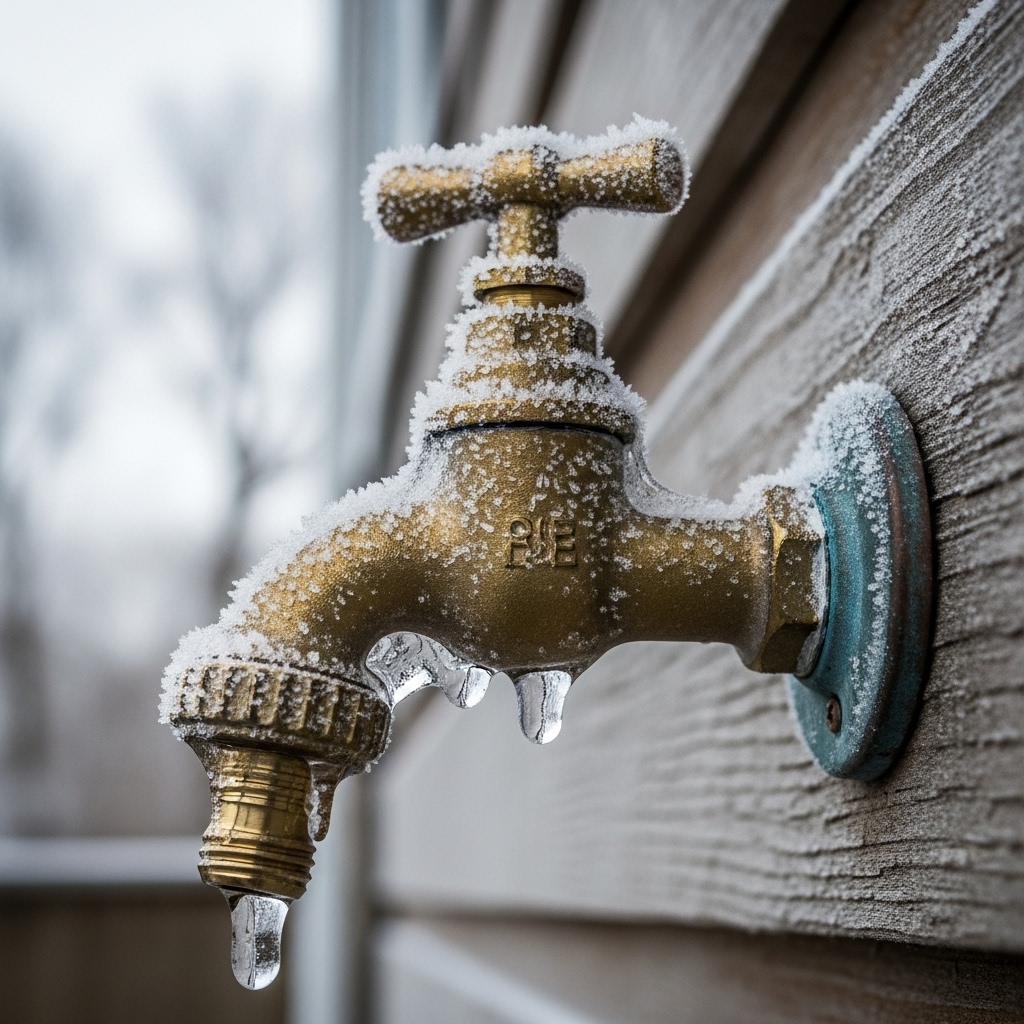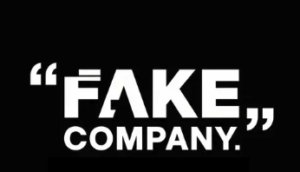Leaky pipe repair cost concerns often start small—a minor drip might seem manageable until you discover water damage behind walls or receive a doubled water bill. For homeowners across Southwest Idaho, from Boise to Twin Falls and throughout Magic Valley, pipe leaks represent a significant threat that can cause extensive property damage if left unaddressed.
Understanding the costs, warning signs, and regional factors affecting pipe repairs helps you make informed decisions and avoid expensive emergency situations.
Early Warning Signs of Pipe Leaks
Identifying leaks early saves thousands in repair costs and prevents structural damage. Watch for these indicators:
Water-related signs:
- Sudden spikes in water bills without increased usage
- Low water pressure affecting multiple fixtures
- Water meter movement when all fixtures are off
- Unexplained wet spots on floors or walls
Environmental indicators:
- Musty odors near sinks, walls, or crawlspaces
- Mold or mildew in unexpected locations
- Water stains on ceilings or walls
- Warped flooring or bubbling drywall
DIY detection methods:
- Water meter test: Turn off all water fixtures and monitor your meter for 30-60 minutes. Movement indicates a leak.
- Sound detection: Listen for hissing or trickling sounds behind walls or near baseboards.
- Toilet leak test: Add food coloring to toilet tanks. If color appears in the bowl without flushing, you have a leak.
Regional Pipe Challenges in Southwest Idaho
Southwest Idaho’s unique conditions create specific challenges for residential plumbing systems:
Soil and geological factors:
- Boise area: Clay and volcanic soil can shift, stressing underground pipes
- Magic Valley: Agricultural soil with high mineral content affects pipe longevity
- Caldwell/Nampa: River valley soil settling can cause joint failures
- Regional seismic activity: Minor earthquakes can loosen pipe connections
Water quality variations: Southwest Idaho’s hard water contains high mineral concentrations that accelerate corrosion in metal pipes. Boise’s municipal water typically measures 180-220 PPM hardness, while Magic Valley areas often exceed 250 PPM.
Climate considerations:
- Elevation differences create varying freeze risks (Boise foothills vs. valley floor)
- Freeze-thaw cycles stress pipes from November through March
- Agricultural irrigation integration affects residential water pressure
Infrastructure age patterns:
- Pre-1970 homes: Often feature galvanized steel (replacement recommended)
- 1970s-1990s construction: Copper piping with potential pinhole leak issues
- 2000s+ builds: PEX and PVC systems with different repair requirements
Types of Pipe Leaks Common in the Region
Freeze damage Southwest Idaho’s winter temperatures create expansion stress in pipes. Uninsulated pipes in crawlspaces, garages, and exterior walls face the highest risk. Boise foothills properties experience longer freeze periods than valley locations.
Pinhole leaks in copper Hard water accelerates copper pipe corrosion, creating small holes that gradually enlarge. These leaks often occur in hot water lines first, typically affecting homes built between 1970-2000.
Joint failures Temperature fluctuations and soil movement cause joints to separate. Common failure points include:
- Soldered copper connections
- PVC glue joints
- Threaded pipe connections
- Pipe-to-fixture connections
Pressure-related damage Municipal water pressure variations can stress older pipe systems. Boise’s elevated areas sometimes experience pressure surges, while rural Magic Valley locations may have inconsistent pressure.
Agricultural system integration Properties with irrigation systems face additional leak risks from:
- Cross-connections between potable and irrigation water
- Seasonal pressure changes
- Aging underground irrigation lines affecting home plumbing
2025 Pipe Repair Costs Across Southwest Idaho
Repair costs vary significantly based on location, accessibility, and materials involved:
Regional labor rates:
- Boise metro area: $100-$160 per hour
- Twin Falls/Magic Valley: $90-$140 per hour
- Caldwell/Nampa: $95-$150 per hour
- Rural areas: Add 15-25% for travel time
Standard repair costs by type:
Minor leaks (accessible PVC/PEX): $150-$350
- Simple joint repairs
- Exposed pipe patching
- Fixture connection fixes
Moderate repairs (copper or wall access required): $400-$750
- Behind-wall leak access
- Copper pipe section replacement
- Multiple fixture connections
Major repairs (difficult access areas): $600-$1,200+
- Under-slab leaks
- Crawlspace repairs requiring excavation
- Multiple pipe section replacement
Emergency service surcharges:
- After-hours calls: Add 50-75%
- Weekend service: Add 25-50%
- Holiday repairs: Add 75-100%
Material cost factors:
- PEX: Most cost-effective for replacements
- Copper: Higher material and labor costs
- PVC: Moderate costs, good for drainage applications
Cost Comparison by Municipality
Permit and inspection fees:
- Boise: $45-$85 for residential plumbing permits
- Twin Falls: $35-$65 depending on work scope
- Caldwell: $40-$70 for standard repairs
- Nampa: $35-$60 for typical residential work
Market competition effects: Boise’s larger contractor pool creates competitive pricing for standard work but higher rates for specialized services. Smaller Magic Valley communities may have fewer contractors but often offer more personalized service.
Rural property considerations: Properties outside city limits may face:
- Service call surcharges ($50-$100)
- Limited contractor availability
- Longer emergency response times
- Well and septic system integration costs
When Professional Help is Essential
Safety-critical situations:
- Electrical proximity: Never attempt repairs near electrical panels, outlets, or wiring
- Natural gas lines: Intermountain Gas service areas require professional coordination
- Structural concerns: Load-bearing walls need proper support during access
- Pressure system integration: Well pumps and pressure tanks require specialized knowledge
Code compliance requirements: Southwest Idaho municipalities require permits for:
- Pipe replacement exceeding 10 feet
- New fixture installations
- Water heater connections
- Cross-connection prevention devices
Insurance implications: DIY repairs may void homeowner’s insurance claims. Professional work includes:
- Proper permits and inspections
- Code compliance documentation
- Warranty protection
- Insurance claim support
Regional specializations to seek:
- Boise area: Mountain home and elevation expertise
- Magic Valley: Agricultural system knowledge
- Older neighborhoods: Historic home plumbing experience
Emergency Response Strategies by Location
Immediate action steps:
- Locate main water shut-off: Usually near the meter or where service enters the home
- Document damage: Take photos for insurance claims
- Contact professionals: Have multiple contractor numbers available
- Protect belongings: Move valuables away from affected areas
Regional emergency contacts:
- Boise: City water emergency line (208) 384-3900
- Twin Falls: Public utilities (208) 735-7270
- Caldwell: City services (208) 455-3000
- Nampa: Utility emergencies (208) 468-5555
Response time expectations:
- Urban areas: 2-4 hours for emergency service
- Suburban locations: 3-6 hours depending on contractor availability
- Rural properties: 4-8 hours, potentially longer during peak seasons
Temporary damage mitigation:
- Use buckets or tarps to collect water
- Remove standing water quickly to prevent mold
- Increase ventilation in affected areas
- Never use electrical devices near water
Repair vs. Replacement Decision Guide
Age-based considerations:
- Pipes over 50 years: Consider full replacement
- 30-50 year old systems: Evaluate multiple leak patterns
- Under 30 years: Individual repairs usually cost-effective
Multiple leak indicators: When experiencing three or more leaks within two years, replacement often provides better long-term value than continued repairs.
Cost-benefit analysis:
- Single leak repair: $400-$800 average
- Partial re-piping: $2,500-$8,000
- Whole-house re-piping: $8,000-$15,000
Insurance and home value factors: New plumbing systems can:
- Reduce insurance premiums
- Increase home resale value
- Provide 10-25 year warranties
- Eliminate ongoing leak concerns
Regional material recommendations:
- PEX: Best for Southwest Idaho’s climate and water conditions
- Copper: Still viable but requires water treatment for longevity
- CPVC: Suitable for hot water applications in moderate climates
Seasonal Maintenance for Southwest Idaho Homes
Spring (March-May):
- Inspect outdoor faucets for freeze damage
- Test irrigation system connections
- Check crawlspaces for winter damage
- Verify proper water pressure throughout the home
Summer (June-August):
- Monitor irrigation systems for leaks
- Check for signs of pipe expansion stress
- Inspect water heater connections
- Test main water shut-off valve operation
Fall (September-November):
- Drain and shut off outdoor water lines
- Insulate exposed pipes in unheated areas
- Schedule professional inspection if over 20 years old
- Prepare emergency contact information
Winter (December-February):
- Maintain consistent indoor temperatures
- Keep cabinet doors open during extreme cold
- Monitor for frozen pipe warning signs
- Know emergency shut-off procedures
Elevation-specific considerations:
- Boise foothills: Begin freeze preparations by late October
- Valley floor locations: December through February primary concern
- Rural properties: Account for longer freeze periods and limited access
Choosing the Right Professional in Your Area
Licensing verification: All Idaho plumbers must hold state licenses. Verify credentials at:
- Idaho Division of Building Safety
- Better Business Bureau
- Local municipality business registrations
Questions to ask potential contractors:
- “How familiar are you with [your area’s] specific water conditions?”
- “What’s your experience with homes built in [your decade]?”
- “Do you handle permit applications and inspections?”
- “What warranty do you provide on repairs?”
- “Can you provide recent local references?”
Red flags to avoid:
- Door-to-door solicitation
- Requests for full payment upfront
- No local address or license verification
- Pressure tactics or “limited time” offers
- Unusually low estimates that seem unrealistic
Insurance and warranty expectations: Professional contractors should provide:
- General liability insurance ($1M+ coverage)
- Worker’s compensation insurance
- 1-2 year warranty on labor
- Material manufacturer warranties
- Permit and inspection coordination
Long-term Planning for Regional Property Types
Urban property considerations:
- Higher water pressure may stress older systems
- Easier contractor access for maintenance
- Municipal water quality monitoring
- Shared infrastructure impacts
Rural property planning:
- Well and septic system integration
- Limited emergency service availability
- Seasonal access challenges
- Water quality testing responsibility
Agricultural property transitions: Former farmland residential developments may face:
- Aging irrigation infrastructure conflicts
- Soil contamination from agricultural chemicals
- Unusual pipe routing from farm conversions
- Cross-connection prevention requirements
Investment property management: Multi-unit properties require:
- Regular professional inspections
- Preventive maintenance programs
- Tenant education about leak reporting
- Emergency response procedures
Preventive Maintenance Investment Analysis
Annual maintenance costs vs. emergency repairs:
- Professional annual inspection: $150-$250
- Average emergency repair: $800-$1,500
- System failure replacement: $8,000-$15,000
Cost-effective prevention strategies:
- Water pressure regulation ($200-$400 investment)
- Pipe insulation for exposed areas ($100-$300)
- Water quality treatment systems ($800-$2,500)
- Smart leak detection devices ($150-$500)
Regional maintenance priorities:
- Hard water areas: Focus on mineral buildup prevention
- Freeze-prone locations: Emphasize insulation and drainage
- Agricultural areas: Monitor for chemical contamination effects
- Older neighborhoods: Plan for systematic upgrades
Making Informed Repair Decisions
Getting multiple estimates: Obtain 2-3 quotes for major repairs, ensuring each includes:
- Detailed problem diagnosis
- Specific repair methodology
- Material specifications
- Labor time estimates
- Warranty information
Financing emergency repairs:
- HomeAdvisor financing programs
- Local credit union home improvement loans
- Emergency home repair assistance programs
- Insurance claim advances
Seasonal timing advantages:
- Spring and fall offer moderate weather for extensive work
- Summer provides fastest drying conditions
- Winter emergency rates are highest
- Off-season scheduling can reduce costs 10-20%
Conclusion
Southwest Idaho’s unique climate, soil conditions, and water quality create specific challenges for residential plumbing systems. Understanding these regional factors, combined with realistic cost expectations and proactive maintenance strategies, helps homeowners make informed decisions about pipe repairs and replacements.
Early detection remains the most effective cost-control strategy, potentially saving thousands in emergency repairs and water damage restoration. Whether you’re dealing with a minor leak or planning system upgrades, professional expertise ensures code compliance, proper materials selection, and long-term reliability.
Need Professional Pipe Repair Service?
Don’t let a small leak become a major expense. Get expert diagnosis and transparent pricing from licensed professionals who understand Southwest Idaho’s unique plumbing challenges.
Call or text TRW Plumbing at (208) 927-3093 for fast, reliable service across Boise, Twin Falls, Caldwell, and Magic Valley.
Visit our website for more information about our services, customer reviews, and helpful plumbing resources tailored to Southwest Idaho homeowners.
Licensed, insured, and committed to honest pricing with no surprise charges.
Created with LeadProspecting AI.
